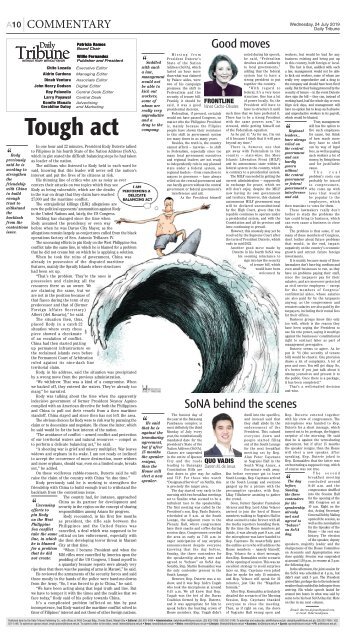DT_20190724
You also want an ePaper? Increase the reach of your titles
YUMPU automatically turns print PDFs into web optimized ePapers that Google loves.
A10 COMMENTARY<br />
Wednesday, 24 July 2019<br />
Daily Tribune<br />
“Rody<br />
previously<br />
said he is<br />
working to<br />
strengthen<br />
the<br />
friendship<br />
with China<br />
to build<br />
enough<br />
trust to<br />
withstand<br />
the<br />
backlash<br />
from the<br />
contentious<br />
issue.<br />
Daily<br />
Tribune<br />
WITHOUT FEAR • WITHOUT FAVOR<br />
WITHOUT FEAR • WITHOUT FAVOR<br />
Chito Lozada<br />
Aldrin Cardona<br />
Dinah Ventura<br />
John Henry Dodson<br />
Roy Pelovello<br />
Larry Payawal<br />
Komfie Manalo<br />
Geraldine Datoy<br />
Tough act<br />
In one hour and 22 minutes, President Rody Duterte talked<br />
to Filipinos in his fourth State of the Nation Address (SoNA),<br />
which in gist stated the difficult balancing steps he had taken<br />
as leader of the nation.<br />
The millions who listened to Rody held to each word he<br />
said, knowing that this leader will never sell the nation’s<br />
interest and put the lives of its citizens at risk.<br />
His thinning line of critics who are as noisy as ever<br />
centers their attacks on two topics which they see<br />
Rody as being vulnerable, which are the deaths<br />
in the war on drugs that they claim have reached<br />
27,000 and the maritime conflict.<br />
The extrajudicial killings (EJK) allegations are<br />
now the political opponents’ ammunition against Rody<br />
in the United Nations and, lately, the US Congress.<br />
Nothing has changed since the time when<br />
Rody assumed the presidency or even way<br />
before when he was Davao City Mayor, as the<br />
allegations remain largely as conjectures culled from the black<br />
operations factory of Sen. Antonio Trillanes IV.<br />
The unceasing efforts to pin Rody on the West Philippine Sea<br />
conflict take the same line, in which he is blamed for a problem<br />
that he did not create but on which he is applying a solution.<br />
When he took the reins of government, China was<br />
already in possession of the disputed maritime<br />
features, mainly the Spratly Islands where structures<br />
had been set up.<br />
“That’s the problem. They’re the ones in<br />
possession and claiming all the<br />
resources there as an owner. We<br />
are claiming the same, but we<br />
are not in the position because of<br />
that fiasco during the term of my<br />
predecessor and that of (former<br />
Foreign Affairs Secretary)<br />
Albert (del Rosario),” he said.<br />
The situation then, thus,<br />
placed Rody in a catch-22<br />
situation where every chess<br />
piece showed a checkmate<br />
of an escalation of conflict.<br />
China had then started putting<br />
up permanent infrastructure on<br />
the reclaimed islands even before<br />
the Permanent Court of Arbitration<br />
ruled against its nine-dash line<br />
territorial claim.<br />
Rody, in his address, said the situation was precipitated<br />
by a wrong move from the previous administration.<br />
“We withdrew. That was a kind of a compromise. When<br />
we backed off, they entered the waters. They’re already too<br />
many,” he narrated.<br />
Rody was talking about the time when the apparently<br />
indecisive government of former President Noynoy Aquino<br />
complied with an American directive for both the Philippines<br />
and China to pull out their vessels from a then maritime<br />
standoff. China stayed and since then has not left the area.<br />
The obvious choices for Rody were to risk war by pursuing the<br />
claim or to deescalate and negotiate. He chose the latter, which<br />
he said would be for the best interest of the nation.<br />
“The avoidance of conflict — armed conflict and protection<br />
of our territorial waters and natural resources — compel us<br />
to perform a delicate balancing act,” he said.<br />
“A shooting war is grief and misery multiplier. War leaves<br />
widows and orphans in its wake. I am not ready or inclined<br />
to accept the occurrence of more destruction, more widows<br />
and more orphans, should war, even on a limited scale, breaks<br />
out,” he added.<br />
On those vociferous rabble-rousers, Duterte said he will<br />
raise the claim of the country with China “in due time.”<br />
Rody previously said he is working to strengthen the<br />
friendship with China to build enough trust to withstand the<br />
backlash from the contentious issue.<br />
The country had, for instance, approached<br />
“Unceasing<br />
efforts to<br />
pin Rody<br />
on the West<br />
Philippine<br />
Sea conflict<br />
take the same<br />
line, in which<br />
he is blamed<br />
for a problem<br />
that he did<br />
not create.<br />
Patricia Ramos<br />
Board Chair<br />
Willie Fernandez<br />
Publisher and President<br />
Executive Editor<br />
Managing Editor<br />
Associate Editor<br />
Digital Editor<br />
Central Desk Editor<br />
Central Desk<br />
Advertising<br />
and Marketing<br />
China as its partner for development and<br />
security in the region on the concept of sharing<br />
responsibilities among Asians for progress.<br />
Rody recounted, in his first few months<br />
as president, the rifle sale between the<br />
Philippines and the United States was<br />
cancelled, a deal which was supposed to be<br />
critical on law enforcement, especially with<br />
the then developing terror threat in Marawi<br />
City at that time.<br />
“When I became President and when the<br />
M16 rifles were cancelled by America upon the<br />
prodding of the US Congress, I found myself in<br />
a quandary because reports were already very<br />
ripe then that there was the passing of arms in Marawi,” he said.<br />
He reviewed the armaments of the security forces and said<br />
those mostly in the hands of the police were hand-me-downs<br />
from the Army. “So, I was forced to go to China,” he said.<br />
“We have been acting along that legal truth and line. But<br />
we have to temper it with the times and the realities that we<br />
face today,” Rody said of his policy towards China.<br />
It’s a complicated problem inflicted on him by past<br />
incompetence, but Rody wanted the maritime conflict solved in<br />
favor of Filipinos’ interest and not those of other foreign nations.<br />
“Saddled<br />
with such<br />
a law,<br />
management<br />
would not<br />
be able to<br />
kick out<br />
workers,<br />
some of<br />
whom are<br />
really very<br />
unproductive<br />
and a<br />
drag to the<br />
company.<br />
“He said<br />
that he is<br />
against the<br />
term-sharing<br />
agreement,<br />
but if after<br />
15 months<br />
the speaker<br />
resigns,<br />
then the<br />
House will<br />
elect a new<br />
speaker.<br />
Missing from<br />
President Duterte’s<br />
State of the Nation<br />
Address (SoNA), which<br />
lasted an hour more<br />
than what was claimed<br />
by Palace aides, were<br />
two of his campaign<br />
promises: the shift to<br />
Federalism and the<br />
security of tenure bill.<br />
Frankly, it should be<br />
said, it was a good<br />
presidential decision.<br />
Federalism, if pressed, certainly<br />
would not have passed Congress, no<br />
matter who the Philippine President<br />
is, mainly because the Filipino<br />
people have shown their resistance<br />
to this shift in government system<br />
too many times in as many years.<br />
Besides, the truth is, the country<br />
cannot afford — tax-wise — to shift<br />
to Federalism, especially since too<br />
many local government executives<br />
and regional leaders are not ready<br />
to independently rule in any planned<br />
state under a federal system, as<br />
regional leaders — from councilors to<br />
mayors to governors — have always<br />
relied on the central government and<br />
can hardly govern without the central<br />
government or federal government’s<br />
interference and aid.<br />
As the President himself<br />
Good moves<br />
FRONTLINE<br />
Ninez Cacho-Olivares<br />
The busiest day of<br />
the year at the Batasang<br />
Pambansa complex is<br />
most definitely the third<br />
Monday of July every<br />
year, the constitutionally<br />
mandated date for the<br />
president’s State of the<br />
Nation Address (SoNA).<br />
Classes are suspended<br />
in the entire of Quezon<br />
City and the roads<br />
leading to Barangay<br />
Constitution Hills are<br />
shut down to give way for rallies<br />
and VIP. For those who watch<br />
“Designated Survivor” on Netflix, this<br />
is precisely the target area.<br />
The day started very early in the<br />
morning with two breakfast meetings<br />
set to finalize what seemed to be a<br />
turbulent race to the speakership.<br />
The first meeting was called by the<br />
President’s son, Rep. Paolo Duterte,<br />
scheduled at 8 a.m. at the South<br />
Lounge, the adjacent room to the<br />
Plenary Hall, where congressmen<br />
have their snacks and coffee during<br />
session days. Congressmen crowded<br />
the area as early as 7:30 a.m. in<br />
eager anticipation of any surprise<br />
announcement despite everyone<br />
knowing that the day before,<br />
Sunday, the three contenders for<br />
the speakership already met and<br />
agreed to “behave” on SoNA day.<br />
Notably, Rep. Martin Romualdez was<br />
the only contender present in the<br />
South Lounge.<br />
However, Rep. Duterte was a noshow,<br />
and it was Rep. Isidro Ungab<br />
who took the microphone at around<br />
8:15 a.m. We all knew that Rep.<br />
Ungab was the bet of the Davao<br />
Coalition formed by Rep. Duterte,<br />
and it was appropriate for him to<br />
speak before the bustling crown of<br />
House members. Rep. Ungab didn’t<br />
noted during his speech,<br />
he said, “Federalism<br />
devolves a lot of authority<br />
to local governments,”<br />
adding that the federal<br />
system has to have a<br />
strong president to put<br />
together the country.<br />
“With regard to<br />
federal, it’s a very loose<br />
structure. One has a lot<br />
of power locally. So, the<br />
President will have to<br />
have to structure it until<br />
such time that we have perfected it.<br />
There has to be a strong President<br />
with the same powers now,” he<br />
stressed, while getting himself out<br />
of the Federalism equation.<br />
As he put it: “As for me, I’m out<br />
of it because I think that it will pass<br />
beyond my time.”<br />
There is, however, one that<br />
got away with Federalism in the<br />
country — state-wise: the Moro<br />
Islamic Liberation Front (MILF)<br />
and its autonomous state within a<br />
federal system in the country, which<br />
is contrary to a presidential system.<br />
The MILF succeeded in getting the<br />
current administration — supposedly<br />
in exchange for peace, which we<br />
still don’t enjoy, despite the MILF<br />
now having its own government<br />
and territory. However, this claimed<br />
autonomous MILF government may<br />
still be declared unconstitutional<br />
by the High Court, given that the<br />
republic continues to operate under<br />
a presidential system, and with the<br />
Constitution and all its provisos and<br />
laws continuing to prevail.<br />
However, this anomaly may yet be<br />
resolved by the Supreme Court after<br />
the term of President Duterte, which<br />
ends in mid-2022.<br />
Another good move made by<br />
Duterte in his fourth SoNA was<br />
his seeming reluctance to<br />
sign into law the security<br />
of tenure bill, which<br />
would have been<br />
welcomed by<br />
dwell into the specifics,<br />
and instead said that<br />
they shall abide by the<br />
endorsement of the<br />
President. This calmed<br />
everyone down and<br />
people started filing<br />
out of the South Lounge<br />
for the next breakfast<br />
meeting set by Rep.<br />
Alan Peter Cayetano<br />
at Nograles Hall in the<br />
South Wing Annex, a<br />
five-minute walk away.<br />
But before everyone got to leave<br />
South Lounge, Rep. Cayetano arrived<br />
at the South Lounge and everyone<br />
ganged up for a picture with the<br />
presumptive speaker, with Rep.<br />
LRay Villafuerte assisting to gather<br />
the crowd.<br />
Soon, former Speaker Pantaleon<br />
Alvarez and Rep. Lord Allan Velasco<br />
arrived to join the herd of House<br />
members walking to Nograles Hall in<br />
what seemed to take forever with all<br />
the media reporters hounding them.<br />
By the time the House members got<br />
inside, it was already past 9 a.m. and<br />
the microphone was later handed to<br />
Rep. Cayetano. He masterfully gave<br />
the outline as to who will address the<br />
House members – namely himself,<br />
Rep. Velasco for a short message,<br />
then Rep. Romualdez on the scenario<br />
of the opening of session. This was an<br />
excellent strategy to avoid surprises<br />
later on. Rep. Cayetano even joked<br />
that he spoke for only 15 minutes,<br />
and Rep. Velasco will speak for 22<br />
minutes, just like the “Magellan<br />
formula.”<br />
After Rep. Romualdez articulately<br />
detailed the scenario of the Morning<br />
Session, Rep. Cayetano thanked<br />
everyone to close the meeting.<br />
Then, as if right on cue, the doors<br />
of Nograles Hall swung open and<br />
workers, but would be bad for any<br />
business existing and being put up<br />
in this country, both foreign or local.<br />
The fact is that, saddled with such<br />
a law, management would not be able<br />
to kick out workers, some of whom are<br />
really very unproductive and a drag to<br />
the company and should have been fired<br />
easily. But for their being protected by the<br />
security of tenure — in the event Duterte<br />
does sign the bill — they can, instead of<br />
working hard, loaf the whole day or even<br />
feign sick days, and management will<br />
have no option but to keep such abusive<br />
and unproductive workers in its payroll,<br />
which would be bloated.<br />
True, management<br />
“Regional<br />
leaders…<br />
have always<br />
relied on<br />
the central<br />
government<br />
and can<br />
hardly<br />
govern<br />
without<br />
the central<br />
government<br />
or federal<br />
government’s<br />
interference<br />
and aid.<br />
SoNA behind the scenes<br />
QUO VADIS<br />
Darren M. de Jesus<br />
still has the option to<br />
fire such employees<br />
for cause, but think<br />
of how much more<br />
they have to shell<br />
out by way of legal<br />
fees, as well as paying<br />
such workers a lot of<br />
money, by firing them<br />
and for justifiable<br />
cause.<br />
The real<br />
problem’s roots can<br />
probably be traced<br />
to congressmen,<br />
who come up with<br />
laws that would<br />
be popular to the<br />
employees, which<br />
then translate to votes for them.<br />
These lawmakers really don’t<br />
bother to study the problems the<br />
law could bring to business, which<br />
can even cause a business to close<br />
shop.<br />
The problem is that some, if not<br />
many of these members of Congress,<br />
don’t bother about future problems<br />
that would, in the end, impact<br />
negatively on the country’s economic<br />
growth and attract future foreign<br />
investments.<br />
It is mainly because many of these<br />
lawmakers don’t have big, medium and<br />
even small businesses to run, as they<br />
have no problems paying their staff,<br />
since the taxpayers pay for their<br />
salaries, and are moreover protected<br />
as civil service employees — except<br />
for the members of Congress’<br />
confidential aides, whose salaries<br />
are also paid for by the taxpayers<br />
anyway, as the congressmen and<br />
senators salaries are also paid by the<br />
taxpayers, including their rental fees<br />
for their offices.<br />
Business groups know this only<br />
too well, which is the reason they<br />
have been urging the President to<br />
use his veto power, saying it would go<br />
against the businesses’ constitutional<br />
right to contract labor as part of<br />
management prerogative.<br />
Duterte seems to agree. As he<br />
put it: “It (the security of tenure<br />
bill) would be chaotic. One provision<br />
draws a lot of complaints. A lot of<br />
pros and cons. You will get dizzy. So,<br />
it’s better if you just talk about it<br />
among yourselves and present it to<br />
the public. Once there is a package,<br />
it has been completed.”<br />
That’s a well-studied decision<br />
and wise.<br />
Rep. Duterte entered together<br />
with his crew of congressmen. The<br />
microphone was handed to Rep.<br />
Duterte for a short message, which<br />
turned out to be, perhaps, the biggest<br />
surprise of the morning. He said<br />
that he is against the term-sharing<br />
agreement, but if after 15 months<br />
the speaker resigns, then the House<br />
will elect a new speaker. After<br />
speaking, Rep. Duterte joked to<br />
Rep. Romualdez that the latter was<br />
orchestrating a supposed coup, which<br />
of course was not true.<br />
The second<br />
“The day<br />
before,<br />
Sunday,<br />
the three<br />
contenders<br />
for the<br />
speakership<br />
already<br />
met and<br />
agreed to<br />
“behave”<br />
on SoNA<br />
day.<br />
breakfast meeting<br />
concluded around<br />
9:40 a.m. and the<br />
congressmen shuffled<br />
into the Session Hall<br />
for the opening of the<br />
18th Congress set at<br />
10 a.m. Right on the<br />
dot, Acting Secretary<br />
General Bobby Maling<br />
opened the session, as<br />
well as the nomination<br />
for the Speaker of the<br />
House — the rest was<br />
history. The election<br />
of the speaker, deputy<br />
speakers, majority leader and the<br />
chairpersons of the House Committee<br />
on Accounts and Appropriation was<br />
done quickly. Session was suspended<br />
at around 1:30 p.m., to resume at 3 p.m.<br />
the following day.<br />
In the afternoon, the joint session for<br />
the SoNA was scheduled at 4 p.m., but<br />
didn’t start until 5 p.m. The President<br />
arrived late, perhaps due to the inclement<br />
weather that troubled his helicopter from<br />
arriving. His whole speech lasted for<br />
around two hours in what was said by<br />
some to be his best SoNA thus far. More<br />
on this in my next column.<br />
Email: darren.dejesus@gmail.com<br />
or tweet: @darrendejesus.<br />
Published daily by the Daily Tribune Publishing Co., with offices at 3450 Concept Bldg., Florida Street, Makati City • Editorial: (02) 831-0496 • Administration: dailytribune@tribune.net.ph, (02) 833-7085 / (02) 551-5148. To advertise and subscribe: ads@tribune.net.ph, dailytribune@tribune.net.ph, (02) 833-7085 / (02)<br />
551-5148. To submit an opinion article, email opinion@tribune.net.ph. To submit a letter to the editor, email: letters@tribune.net.ph • News: news@tribune.net.ph • Metro: metro@tribune.net.ph • Lifestyle: lifestyle@tribune.net.ph • Business: biz@tribune.net.ph • Sports: sports@tribune.net.ph • PR: pr@tribune.net.ph.

















